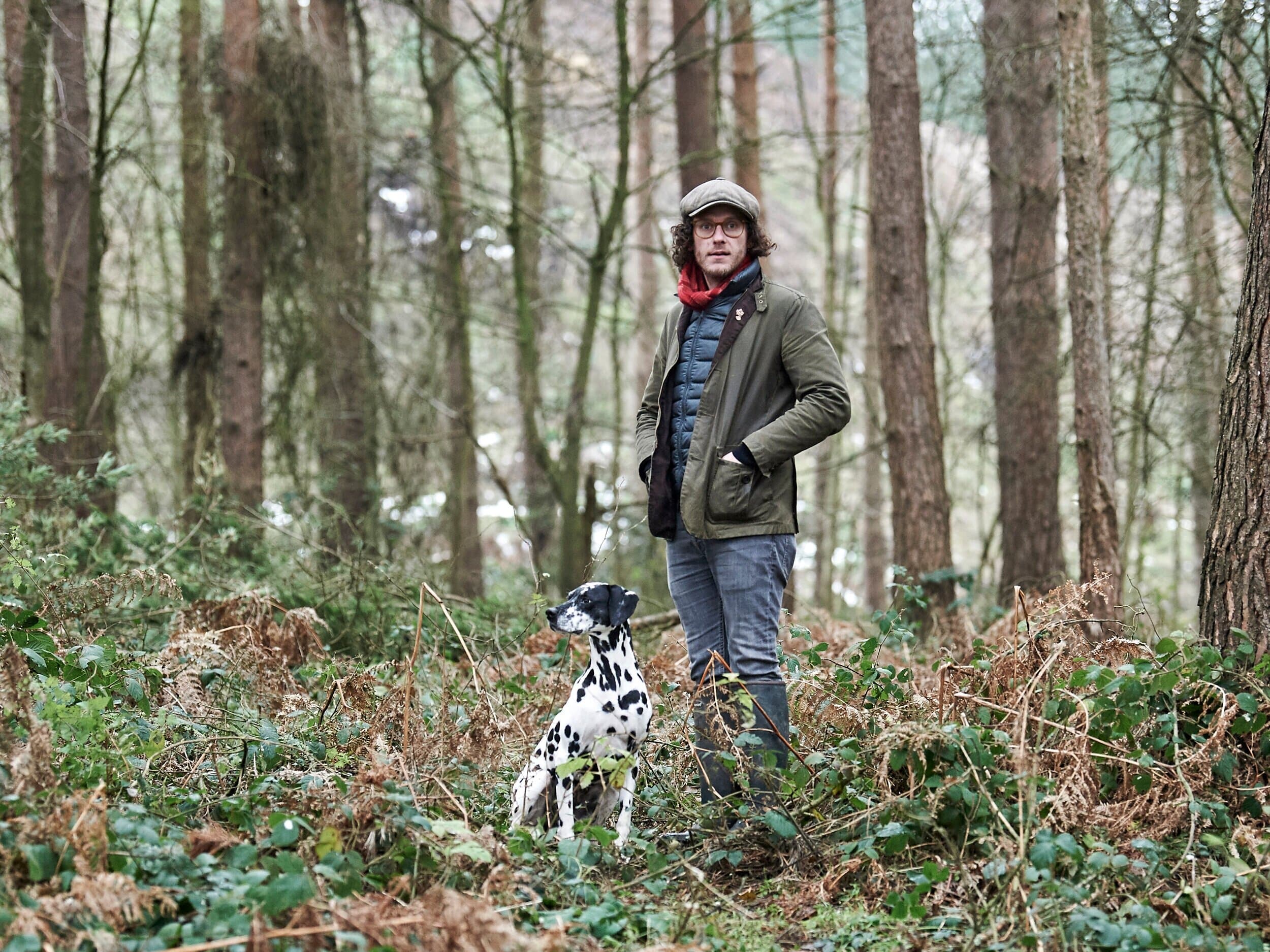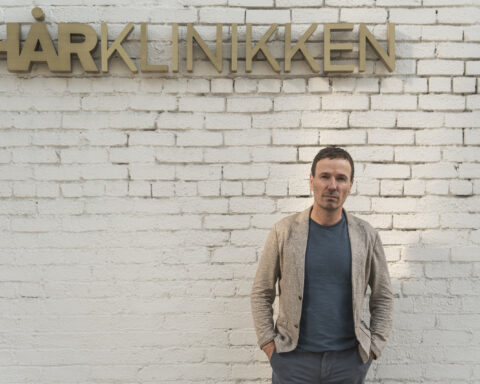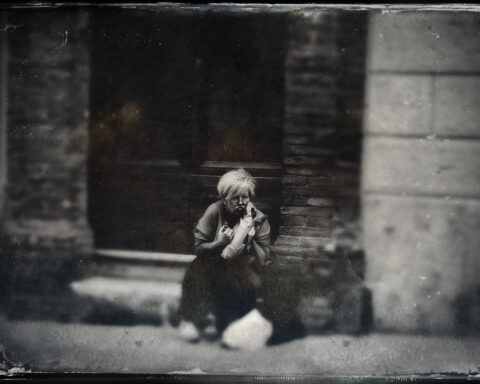Ben Branson is part revolutionary, part artist and part farmer — epitomized by the word “PEAS” tattooed across the knuckles of his right hand.
In 2013 — inspired by a 17th Century book called ‘The Art of Distillation’ and his family’s farming heritage in Lincolnshire, England — he began experimenting with distilling herbs in copper pots to produce zero proof drinks with the complexity of alcoholic spirits.
Two years later, he launched Seedlip and released the world’s first distilled non-alcoholic spirit. The company kickstarted an alcohol free revolution with dozens more companies now entering the space and the hospitality industry now starting to treat non-drinkers with more respect.
Whether we are cutting down alcohol or cutting it out altogether, we no longer have to sacrifice the familiar and desirable rituals of drinking — like watching a bartender artfully create a cocktail, or making a sophisticated 5pm drink at home with a beautiful bottle pulled from a carefully-curated drinks cabinet.
We spoke to Seedlip founder Ben about how he changed an industry and his goals for the future. And in a supplementary piece, we have also produced a guide of the best non alcoholic spirits to replace or supplement your favorite spirits here.
Do you think more people are looking for alternatives to alcohol? And if so why?
When Seedlip launched in London in 2015, there were very few alternatives and only a small trickle of people in the industry talking about non-alcoholic options. But we began to demand better. There was a paradigm shift beginning in peoples’ attitudes towards food; where it came from, what it’s made of, who made it. Our health was on the agenda, we began to look after ourselves, we began to curate our lives online and slowly over the last five years, we’ve seen that transfer into our drinking choices. Better, fewer, more premium, more informed, and this incredibly exciting ecosystem has taken shape with events, producers, retailers, menus, articles, and podcasts all dedicated to the non-alcoholic space. It’s happening globally, it’s now gathering speed and we are proud to be flying the flag from London to Los Angeles, Singapore to Sydney, showing it’s possible to make delicious drinks that don’t need to contain alcohol.
Do you think it’s important to offer people options for a positive, exciting alternative to alcoholic drinks? Rather than not drinking being considered a ‘boring’ choice?
Back in 2013, I was out for a meal on a Monday evening and not drinking alcohol. I was given a pink, fruity, childish mocktail that was too sweet, didn’t pair with the food or fit the occasion. The seed was sown for creating something adult — a drink with all the sophistication and ritual of alcohol that was non-alcoholic. I had already begun distilling herbs from my garden at home as a hobby and with a background in farming and design… well, all the ingredients were there to create something special for those discerning about their food, their drinks and their health that was not a compromise. It took two years of experimentation to then launch the world’s first distilled non-alcoholic spirit called Seedlip and solve the dilemma of what to drink when you’re not drinking.
Do you think your product allows people to enjoy the benefits of some of the rituals of drinking — like the community in a bar or the satisfaction of making a carefully-crafted evening drink at home — without the drawbacks?
I reviewed every single aspect of the social occasion — from where people were drinking to what they were reading on a menu, how bartenders explained cocktails, how a back bar was set up, pricing both in store and at the bar, the glassware, the garnishes, and through to why people might not be drinking alcohol — pregnant, driving, having a night off. This was all critical to creating positive rituals that felt familiar. So you choose a drink from the menu, the bartender takes the base spirit bottle off the back bar, the cocktail is made in front of you — beautifully, with care and effort. You feel good about your choice, you feel looked after, the bartender feels good they are being a great host, it tastes delicious. You feel part of. It’s a win win!
Who are your customers and what do you think is important to them?
Our three Seedlip non-alcoholic spirits — Spice 94, Garden 108 & Grove 42 — as well as our other brand of non-alcoholic Aperitifs called Æcorn are enjoyed in over 35 countries in the best bars, restaurants, hotels, and retailers and across the world there are three defining audiences. We call them the ‘aren’ts’, the ‘can’ts’, and the ‘don’ts’. They are united by a belief in quality, in choice and in great taste regardless of the alcohol content.
What was your inspiration to launch the brand?
Seedlip is a product of my upbringing. My mother’s side has been farming in England for nine generations — over 300 years. And my father has been in the design industry for over 40 years. Seedlip is the embodiment of my love and obsession for the natural world, and affinity for design. I believe the part that turned this from a personal hobby into an internationally recognized business was meeting a need in peoples’ lives at a time when they were actively beginning to moderate their alcohol intake. We’re just getting started, which is incredibly exciting!

Ben’s farming heritage influenced his bold business plan
Tell me a little about the process of how you developed the drink at the start?
In 2013, I came across a book written in 1651 called ‘The Art of Distillation,’ which outlined herbal remedies — both alcoholic and not. Ever the tinkerer, I bought a small copper still online and began experimenting with herbs from my garden. The process of taking ingredients and using distillation to capture their flavor and aroma in liquid form was magical. Slowly but surely, evenings and weekends turned into an obsession, to traveling up and down the country visiting botanical gardens, natural history museums, libraries, and beginning the delusional, naïve belief that maybe a distilled non-alcoholic spirit could change the way the world drinks and shine a light on a 360-degree approach to hospitality where no one is forgotten.
And now what is involved in making Seedlip on a larger scale?
From my kitchen and making small batches that kept selling out in London to where we are today, well, the last five years has been surreal. Much has changed and the growing pains of building a global business at pace and properly has definitely been felt by my team and I, but some things haven’t changed: Our continued commitment to quality and consistency; our ambition to change the way the world drinks; the need for all hospitality venues to provide options for those not drinking. These are constant and we have worked hard to ensure we have the infrastructure in place to handle the demand for our products.
What ingredients do you use? How do you source them?
We source over 18 of the best ingredients working with farmers and growers all over the world. Each expression has six botanicals that are individually macerated, copper pot distilled and filtered using an involved, six-week process before blending and bottling.
Can you tell us a bit about your farming heritage has influenced you?
Beyond instilling a love of the natural world in me, farming is where the name of the brand comes from. A seedlip is the name for the basket that farmers, including my family, would sow seed from back in the 17th century. I sat with my gran one day asking her questions about what she had been told from her parents about our farming heritage and she told me all about seedlips. It stuck. It was a great fit, accurately and literally explaining our process from seed to lip, but also a warm ode to my family’s history.

Ben, with PEAS tattooed on his right knuckles, at the bar in Shoreditch House
Can you explain a bit about each of the main three flavors of Seedlip and how each is best used?
Seedlip Spice 94 is an aromatic blend of allspice berries & cardamom. Lemon and grapefruit peels give the liquid fresh citrus top notes, which balances the long, bitter finish from high-quality oak & cascarilla barks. It’s earthy and warm, but balanced by a bright bitterness that lends really well to being paired with ginger ale and drinks like a Panoma, Espresso Martino, or Toddy. Seedlip Garden 108 is a uniquely savory blend with top notes of peas and hay and a complex herbal base of spearmint, rosemary and thyme. It’s delicious served simply with Fever Tree’s ginger ale or used alongside fresh ingredients for an Eastside or Garden Sour. Seedlip Grove 42 boasts more familiar flavors of blood orange, bitter orange, mandarin, ginger, lemongrass and lemon peel. It’s vibrant and versatile in drinks like a Margarita, Minosa, or with a top of ginger ale. For more cocktail recipes, see here.
What constitutes a non-alcoholic spirit? There seems a real art to the process — what is the difference between the product you and some of your peers offer compared to some less premium alternatives?
An alcoholic spirit is usually made using distillation to extract and concentrate the alcohol before being diluted to the right proof with water. Our non-alcoholic spirits are made using distillation and diluted to the right strength with water. The main difference is that we distill out the alcohol used in macerating our ingredients. There are now over 70 non-alcoholic spirit companies globally, which is incredible. Sadly, with such enthusiasm about a category, there comes shortcuts, copycats and poor quality entrants, but thankfully there is an educated consumer and many of the new brands are intent on producing high-quality options and offering customers great choice.
What do you think the future is for the non-alcoholic spirit market?
When I was hand-making the first batches of Seedlip in my kitchen as a one-man band, never ever did I imagine that a few years later people would drink it in so many of the world’s best bars and restaurants, embracing this trend and our brand so firmly in their lives. There is a growing and vocal audience out there who don’t believe you need alcohol to have a good time, or to fit in. Our goal is normal. No more ‘are you ok?’ questions. No need for compromise. So, whether you want to drink or alcohol or not, whether you eat meat or not, whatever your personal choices — they’re yours. Seedlip and the movement have a bright future ahead in the US and our drinks are available in many top bars, restaurants and retailers in over 10 states, as well as nationwide availability from our website. We have big plans for the years ahead and are excited to see our customers and society demanding better options. It makes our work far easier.
And what about the hospitality industry? How do you see that developing to keep up with the times?
My hope, and I see no reason why this won’t happen, is that the industry continues to embrace this space, continues to show that putting the same effort and care into their non-alcoholic options as their alcoholic ones, is both welcomed and required to truly deliver modern hospitality. Mocktails will not do. Treating those not drinking like children or invalids is no longer ok, so more menus, more shelf-space, more events, more education, more column inches… I think this is the most exciting movement and shift happening in the drinks industry. Onwards!
If you make a purchase through a link on this site we may receive a commission, at no extra cost to you, which helps us to continue to produce our content.











